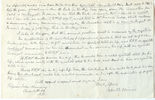Pages
1
February 18, 1893.
My dear Sir,
If I have the misfortune to differ with you in the Construction of the limitation which you [propenned?], you must as [?] it largely to the engrossment of my [?] by [?] pressing [?] [since?] the receipt of your letter of 10th.
In [substance?] the limitation in [position?] is by deed to M in [lines?] [M G P, for?] for, her life, and if RO.P, her husband, shall [?] M G.P, then to RO.P for his life, remainder after the termination of the said life-[estates?], to the heirs of RO.P.
I assume that M G.P and RO.P are both yet [?].
I. The first question is whether RO.P takes a [vested?], [or?] a [Contingent?] remainder, and I regret to find myself [obliged?] to [t?], after some [-ations?] of opinion, that it is [Contingent?].
The distinction [attribute?] of a [vested?] [remainder?] is that if [possesses?] a present [capacity?] to take effect in [possession?], if the [possession?] [should?] by only mean [become?] [vacant?]. ([F?] Rem as 216 [Rev?]). Now if
2
The possession should become vacant by the death of Mg.P, RO.P's remainder would have a present capacity to take [effect?] in possession, but what if MG.P's estate [were?] determined [before?] her death, by [S?] or forfeiture, RO.P's remainder would not then have the need [for?] present capacity to take effect in possession, and therefore I conclude it is not [vested?].
Of course this assumes that a life estate may be determined in the life-time of the [?] for life. That it may be to determined by [?] is, I suppose, [?], but I [conceive?] that it may be with [like?] [certainly?], determined by forfeiture, [as?] by the life-tenant [con?] to an [a?], or to a corporation, [?] [no?] legal power to receive a [conveyance?] of lands. ([F?] [Re?] 217.-18: 2 min. [?]. 170.-71([t?]). 1k.)
2. [Suppository?] the remainder to RO.P to be Contingent, a [s?] question presents [?], whether the Rule in [Sha?'s] Case (which I am pleased that you have had the good sense to retain in [N?]. [C?]), would [?] the [limitation?] to RO.P's heirs with that to [RS.P?], and then [?] in [?] an [e?] estate in fee. [?] [ate?] the limitations [as?] equitable,
3
no [?] would arise from the [fort?] if their equitable character, (2min. [?]. 402-3 ([t?]): but their [?] [?] is [over?] the Rule in [Sh?] Case apply where the [C?] [?] hold is Contingent. It seems to me that the Ru;e demands that it should be [?], but I can [cite?] [you?] [s?] to that effect, [?] that in [?] [F?] [?], which contains a [?] of very [?] example, the [C?] estate is in [?] Contingent, [be?] [?] [?], [h?] [708?] [rev?], Rule in [Sh?] Case.
I [?] if [therefore?], that this seemed [question?] must be [answered?] in the negative.
The [Continuation?] of this limitations, if apprehend, would be that whilst MGP. [?] husband [au?] [with?] [?], MGP would take an equitable estate for life, and RO.P. an equitable Contingent remainders for his wife, dependent on his [s?] his wife, with an equitable Contingent remainders, to RO.P's heirs.
If R O. P should [s?] his wife, then he would have a [vested?] equitable estate for his wife, which would [wrath?] with the equitable estate to his heirs, and [back?] in him an equitable estate in fee.
Should RO.P die in his [?] life-time, then limitations to him would fail, and his heirs [?] them [d?], would take a [vested?] remainder in fee, after the [e?] of mgp's life-estate.
With[?] [?[ and [?], I am Truly [Yours?], John B. Minor
[?] [] Manning [?] [N.e]



